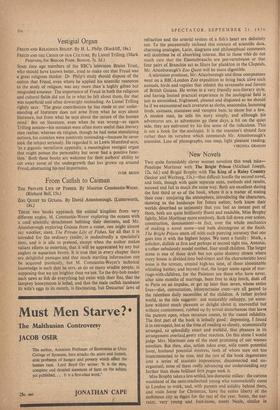Vestigial Organ
SOME time ago members of the BBC's television Brains Trust, who should have known better, tried to make out that Freud was a great religious thinker. Dr. Philp's study should dispose of the notion that Freud, even where he applied his scientific resources to the study of religion, was any more than 'a highly gifted but misguided amateur. The importance of Freud in both the religious and cultural fields did not lie in what he felt about them, for that was superficial and often downright misleading. As Lionel Trilling rightly says: 'The great contribution he has made to our under- standing of literature does not arise from what he says about literature, but from what he says about the nature of the human mind.' But on literature, even when he was wrong—as again Trilling notices—his mistakes were often more useful than literary men realise; whereas on religion, though he had some stimulating notions, his mistakes were positively misleading—because he never took the subject seriously. He regarded it, as Lewis Mumford says, 'as a gigantic vermiform appendix; a meaningless vestigial organ that might poison the personality but never had a positive func- tion.' Both these books are welcome for their authors' ability to cut away some of the undergrowth that has grown up around Freud, obstructing his real importance.
IVOR BR1EN


































 Previous page
Previous page